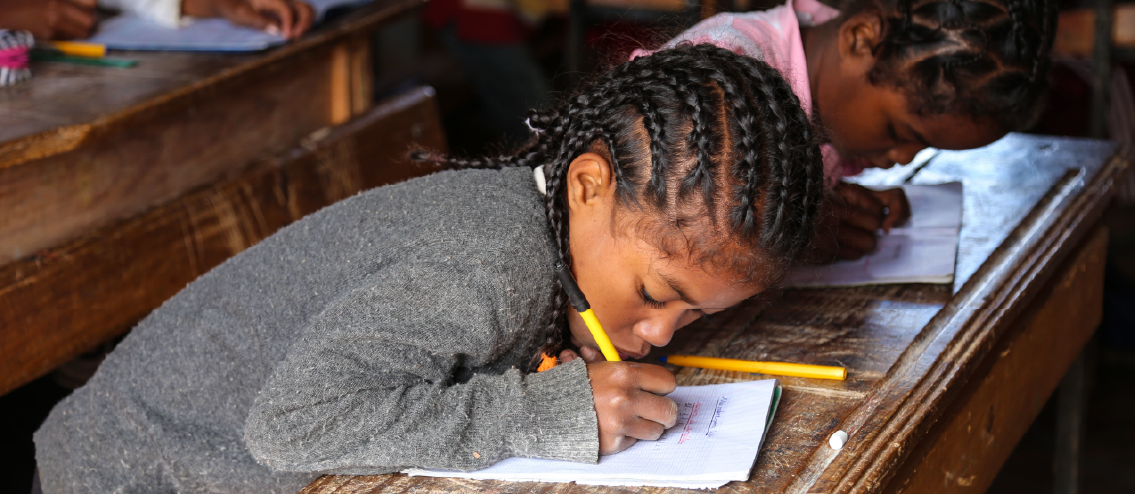 Photo: Mohamad Al-Arief/ The World Bank
Photo: Mohamad Al-Arief/ The World Bank
This blog entry is part of a series that highlights insights from research for development policies and practices, supported by the Knowledge for Change Program (KCP).
Does schooling necessarily lead to true learning outcomes? How does a mother’s educational level impact educational outcomes of her children? And what are the effective mobilization modalities for parental involvement in children’s learning endeavors and school activities? The research pieces that we are featuring today will help answer these questions.
This past Saturday, April 23, was the World Book and Copyright Day, designated by UNESCO. While we recount the benefits of reading, we can’t help but notice that we are still a bit far from achieving the Sustainable Development Goal 4 (SDG 4) on education and learning. One of the sub-indicators of the SDG 4 aspires to ensure that all youth and a substantial proportion of adults, both men and women, achieve functional literacy and numeracy. Sadly, over 770 million adults still cannot read or write.
The failure of attaining true educational outcomes may be stemmed from lack of foundational skills due to insufficient early childhood development, lack of needed skills and motivation from teachers, low quality school management or outdated school inputs and insufficient resources, as highlighted by the 2018 World Development Report – Learning to Realize Education’s Promise (WDR2018) which the KCP program supported. Today, we will zoom in on the role of parents in children’s educational outcomes and illustrate evidence on effective mobilization strategies of more parental involvement.
-
Is schooling equal to learning?
The answer is no. Education is a powerful tool for individual and societal empowerment, and it serves as an engine to accumulate human capital in order to realize one’s true potential. However, in many parts of the world, we are facing a multi-dimensional learning crisis. The increasing rate of school enrollment does not necessarily lead to actual learning by students. Many have completed primary education without acquiring sufficient competencies, lacking basic literacy and numeracy skills. In fact, the great schooling expansion over the past few decades was not necessarily translated into real learning outcomes in many low-income countries (WDR 2018).
In one of the background papers prepared for the WDR2018, the researchers revealed daunting results that in six out of the ten low-and lower-middle-income countries they studied, only about half younger adults aged 18-37 who completed primary education could read a three-sentence passage without assistance. By analyzing the Financial Inclusion Insights surveys, the authors argued that it was an untenable assumption that schooling would reliably lead to learning, and that purely looking at school enrollment rate would disguise real learning results . In addition, schooling targets such as Universal Primary Completion on schooling attainment can only achieve slightly better gains for female literacy in many countries. In Uganda for example, gender parity for attainment could only bring female literacy to 41 percent.
-
How does maternal educational level impact educational outcomes of children?
One set of projects that KCP has supported examined children’s family environment, which had been assumed to have no causal linkages with children’s outcomes, according to the classical model of human capital accumulation. Through a series of research endeavors on learning and educational achievements in Pakistan between 2009 and 2012, researchers found that in families where the mother had had some education, there were considerably more extra efforts put in by the mothers, children, and households in educational activities. In particular, one project demonstrated that there existed a clear causal link between maternal education and time spent with their children on educational activities outside of school settings – children of mothers with some education spend as much as 75 minutes more for every child. And mothers with some education also spend 40 minutes more with their children to help with schoolwork. These additional efforts would also pay off, as test scores of those children were also significantly higher. Moreover, it was also revealed that there was no relationship between maternal education and mother’s choice of the provision of child-specific goods, such as tuition, purchase of uniforms or pocket money – this spoke to the phenomenon of low bargaining power at home. The data suggested that even with no influence on decisions related to household choices, the mother’s productivity and her preferences toward children’s education can be positively affected by the increasing level of her educational level. In sum, we can reasonably expect a more conductive family environment for children’s learning at households where the mother has attained higher level of education.
-
How to better mobilize parental involvement in children’s school activities?
Recognizing the importance of mobilizing parents in the involvement of their children’s educational activities, another KCP-funded project recently examined the effectiveness of different mobilization strategies for parents’ involvement through a randomized control trial in 126 schools in the Angolan province of kwanza Sul. The researchers revealed in a working paper in 2021 that direct provision of information to parents alone was effective in improving parenting practices at home, such as helping children with their homework or instilling more discipline into children’s time management in their studies. But evidence also suggested that the information campaign alone had no impact on parents’ engagements at school such as participating in school institutions such as school boards. In addition, the research demonstrated the usefulness of less expensive alternatives to encouraging parental engagement – organizing parents’ meetings and facilitating discussions on school related issues among themselves, without exogenous information provision. Such revelation highlighted that the indirect fostering of cooperation and coordination among parents would significantly increase their participation in formal school institutions.
Moreover, the approach that combines information and meetings treatments also led to improvement of parental involvement both at home and participation in school institutions, as well as indirect positive effects on other outcomes, such as measures of school management and quality of school infrastructure. Lastly, when studying whether the interventions would result in enhanced school performance in standardized tests by students, the results were mixed – the interventions did increase performance but only in schools where the original baseline was high. This may be due to the fact that it takes much longer time for benefits of parental involvement to be translated into better educational outcomes.
The exploration into what leads to real learning gains has come a long way. A decade or more ago, many development interventions were focused on building new schools and improving school enrollment rates, but the learning crisis prompted us to delve deeper into the factors that truly affect learning outcomes. The KCP will continue will to finance projects that bring a comprehensive and holistic understanding to education and learning.
The authors would like to acknowledge contributions from the following projects under the guidance of task team leads (TTLs) and researchers: World development report 2018: Learning to realize education's promise (TTL: Deon Filmer); Learning and Educational Achievements in Pakistan (TTL: Das Jishnu); and Mobilizing Parents at Home and at School: An Experiment on Primary Education in Angola (TTL: Vincenzo Di Maro)
About the blog series: The Knowledge for Change Program (KCP) has launched a blog series to retrospectively highlight a selection of research projects conducted over the past 20 years, many of which still remain highly relevant and offer great lessons for development policies and practices today. Managed by the Development Economics Vice Presidency of the World Bank (DEC), the KCP promotes evidence-based policy making through research, data and analytics. To celebrate the KCP’s fourth phase launched in November 2020, this blog series will look into the wealth of knowledge researchers have generated in KCP’s previous phases, distill lessons learned, and inspire discussions on future research directions.



Join the Conversation